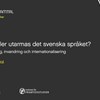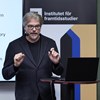stilla
Still heating: Unfolding a typology of climate obstruction
In N. Marschner, C. Richter, J. Patz, & A. Salheiser (Eds.), Contested climate justice – Challenged democracy: International perspectives (pp. 59-71). Campus Verlag GmbH Abstract Earth is on a catastryet, there is little sign of halting the rise of global greenhouse gas emissions orstopping the extraction of fossil fuels. Against this background, in this articlewe re-engage with a recently proposed typology supposed to cover three modesthrough which effective climate action has been obstructed. These are, first,primary obstruction, that is, the spread of disinformation and/or denying the veryexistence of anthropogenic climate change. Second, secondary obstruction concernsmore or less deliberate obstruction via opposition to climate action and policiesvia, for example, reference to “the threat of deindustrialisation”. Finally, tertiaryobstruction denotes modes of living which, while not necessarily obstructingeffective climate change intentionally, concerns “living in denial”. Drawing onrecent research and examples, we revisit this typology.
How do we measure well-being?
Stella lives with her family in a villa in a medium-sized town in Sweden. She likes her job but her back is hurting. How do we measure her well-being? Increasing well-being is generally accepted as one

Offentliga samtal: Berikas eller utarmas det svenska språket?
Språkutveckling, invandring och internationalisering Ibland får vi läsa att det svenska språket är hotat. Det kan röra sig om engelskans inflytande på bekostnad av svenskan, ungdomens slangord och b

Why we need research on AI impact now. Pontus Strimling (introduction from Gustaf Arrhenius)
Artificial intelligence is already here and is changing society. But social science research on the impact of AI and which choises and ethical considerations societies will face due to developments in
Chandra Kumar: Racist Explanations
Chandra Kumar, with a PhD in Philosophy, teaches philosophy at the Department of Philosophy at York University in Canada. AbstractWhile crudely and explicitly racist explanations persist in our social
The Difference Principle Would Not Be Chosen behind the Veil of Ignorance.
The Journal of Philosophy 115 (11):588-604, DOI: 10.5840/jphil20181151134 Abstract John Rawls argues that the Difference Principle (also known as the Maximin Equity Criterion) would be chosen by parties
Four Phases in Demographic Transition: Implications for Economic and Social Developments in Sweden 1820-2000
In contrast to earlier research, historical and contemporary comparisons to Swedish demographical changes show that the age group upon which the population growth is based—either child, adult, maturit

Moral uncertainty
Participants: Krister Bykvist, Toby Ord and William MacAskill. Very often we are uncertain about what we ought, morally, to do. We do not know how to weigh the interests of animals against humans, how
Epidemiologist on the corona epidemic
What do we know today about Corona and the way it spreads? Why do different countries act differently in reaction to the pandemic? Why are large events forbidden while schools are still open? Why are
Utilitarianism without Moral Aggregation
Canadian Journal of Philosophy (2021), 51: 4, 256–269 Is an outcome where many people are saved and one person dies better than an outcome where the one is saved and the many die? According to the stan








